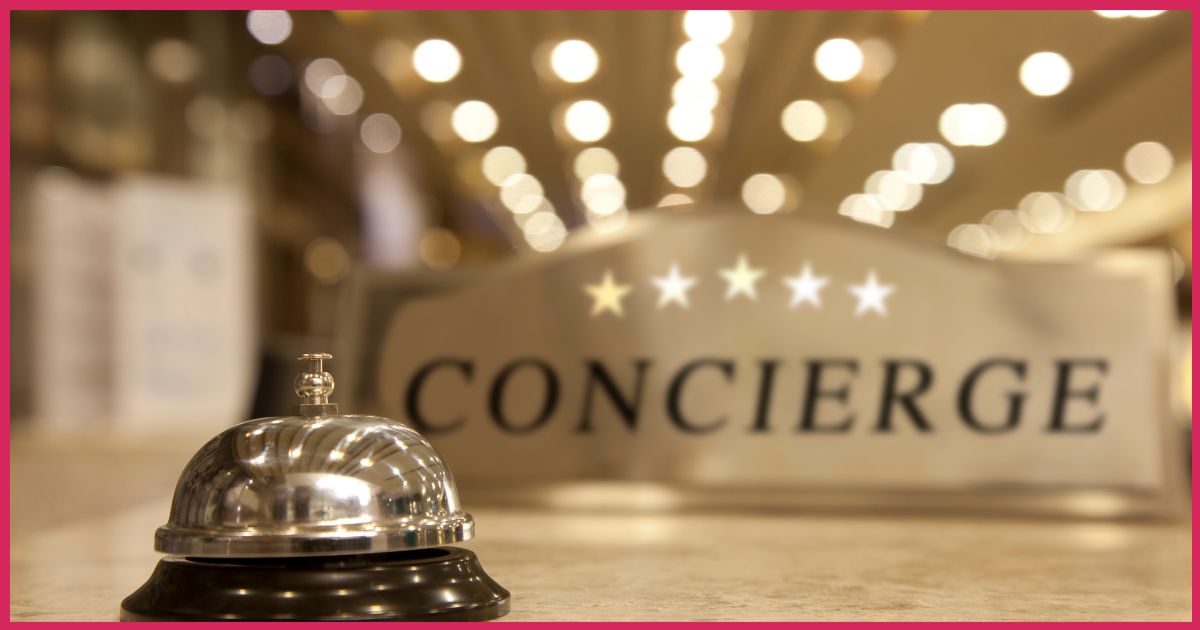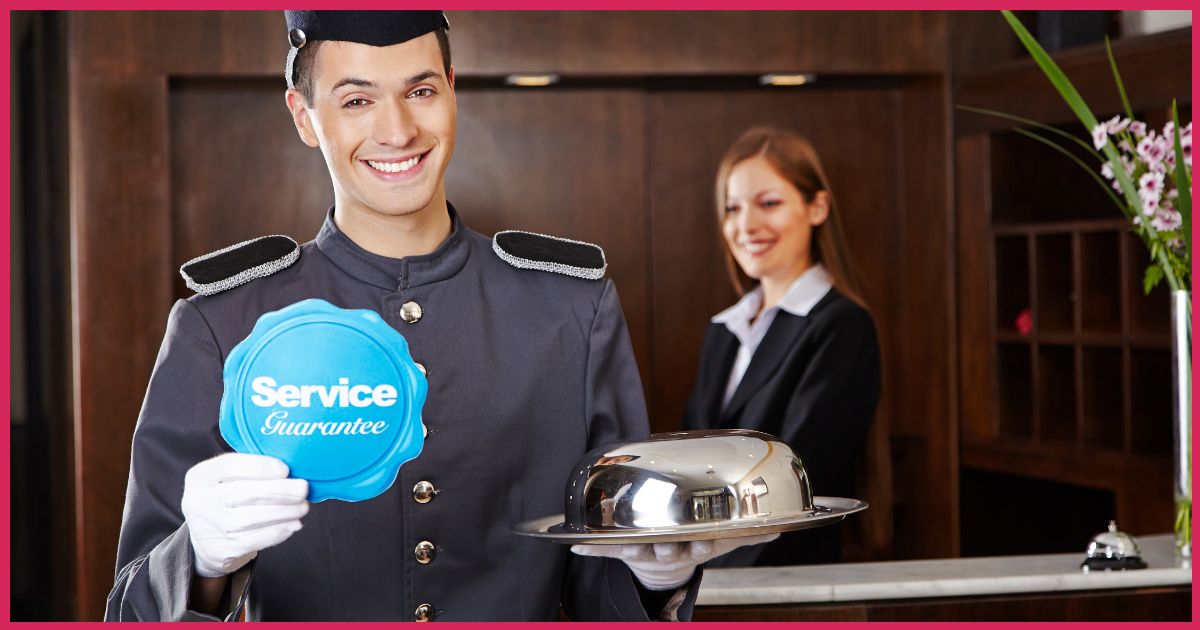What is a Hotel Concierge: Your Essential Guide to Guest Services
A hotel concierge is a professional who provides personalised services to guests in a hotel setting.
Their primary function is to assist guests by making restaurant reservations, arranging for spa services, recommending nightlife hot spots, booking transportation, and accessing other amenities that may enhance the guest experience.
They act as the go-to resource for visitors interested in exploring what the local area has to offer.
With comprehensive knowledge of local attractions, events, and services, concierges are skilled in customer service and communication.
They are often seen as the key to unlocking a memorable and hassle-free hotel experience.
Whether a guest is looking for the best local cuisine or needs assistance planning a day trip, the concierge is there to facilitate these requests with efficiency and expertise.
The role of a concierge extends beyond mere recommendations and reservations. They frequently handle unusual and complex requests, exemplifying their ability to provide exceptional service tailored to individual preferences and needs.
This personalised attention can differ significantly from one hotel to another, but the ultimate goal remains the same: to ensure that guests have a pleasant and unforgettable stay.
Role of a Hotel Concierge
A hotel concierge acts as a professional personal assistant to guests, offering a wide array of services to enhance their stay.

Guest Services and Responsibilities
The concierge is tasked with personalising the guest experience. They provide assistance that is tailored to individual preferences and needs.
Their primary responsibility is to ensure guests have a memorable and hassle-free stay.
- Navigation assistance: offering maps and directions.
- Reservations: booking restaurants, events, and transport.
- Local expertise: providing recommendations for attractions and activities.
Communication is central to their role, as they interact with guests to understand and cater to their specific requirements.
Typical Duties and Tasks
Concierges perform various duties to meet the diverse needs of hotel guests.
|
Task Category |
Examples of Duties |
|
Reservations |
- Restaurant bookings - Ticket procurements for events - Spa and golf tee times |
|
Travel Arrangements |
- Taxi and limousine services - Flight confirmations and check-ins |
|
Personal Assistance |
- Sending and receiving parcels - Wake-up calls |
|
Special Occasions |
- Arranging gifts - Planning celebrations |
Each task is executed with a high level of professionalism and courtesy, emphasising the concierge's role in providing an elevated guest experience.
The Evolution of the Concierge Profession
The concierge profession has transformed substantially from its inception, adapting to the ever-changing demands of the hospitality industry.

Historical Background
The title 'concierge' dates back to France in the Middle Ages, where individuals known as concierges were responsible for maintaining order and assisting the needs of visiting nobles in castles. The word itself means ‘keeper of the keys’, and they would do just that.
By the 19th century, the role had established itself firmly in European high society, notably in grand hotels, providing an array of services to upscale clientele.
The concierge played a crucial role as a gatekeeper, an informant, and a facilitator for guests who sought tailored services and local recommendations.
Modern Developments
Today, the profession has embraced technology to meet the sophisticated expectations of contemporary guests.
Concierges utilise digital tools such as email, mobile applications, and social media to provide prompt service and insider knowledge on local attractions, events, and dining.
They often undergo certified training programs, such as those offered by Les Clefs d'Or, an international association of hotel concierges, to refine their craft and maintain professional standards.
The role continues to evolve, with some concierges specialising in certain domains like gastronomy, theatre, or personal shopping to enhance the guest experience.
Skills and Qualifications of a Concierge
The concierge is a pivotal figure in the hospitality industry, equipped with a diverse skill set and specific qualifications that enable them to provide exemplary service.

Essential Skills
- ✅ Communication: A concierge must possess excellent verbal and written communication skills, being able to articulate instructions and recommendations clearly to clients and effectively correspond with various departments and outside services.
- ✅ Customer Service: They should excel in customer service, demonstrating patience, politeness, and the ability to understand and respond to guest needs promptly.
- ✅ Problem-Solving: The ability to swiftly identify and resolve issues, offering practical solutions to ensure guest satisfaction is essential.
- ✅ Multitasking: A concierge must be capable of handling multiple tasks simultaneously without compromising service quality.
- ✅ Cultural Knowledge: They should have a broad understanding of local attractions, events, and customs to provide tailored recommendations for guests.
- ✅ Discretion: Maintaining confidentiality and exercising discretion is crucial in dealing with guest information and requests.
Professional Qualifications
- ✅ Education: A minimum of a secondary school education is often required, with many employers preferring candidates who have completed higher education in hospitality or tourism management.
- ✅ Experience: Prior experience in hospitality, customer service, or a related field is typically expected.
- ✅ Languages: Proficiency in multiple languages can be advantageous, especially in areas with a high volume of international visitors.
- ✅ Certifications: There are professional industry certifications available, such as from the Les Clefs d'Or or local hospitality institutions, which may enhance career prospects.
Types of Concierge Services
Hotel concierges offer a variety of services geared towards enhancing a guest's stay.

Standard Concierge Services
The traditional duties are robust, addressing the day-to-day needs of hotel guests. Concierge desks commonly provide:
- Travel Assistance: Information and booking for transport, such as taxis, limousines, or trains.
- Dining Recommendations: Advice on local dining options, including reservation bookings.
- Entertainment and Activity Planning: Suggestions for local events, shows, and attractions, with ticket acquisition if required.
- General Information: Answers to queries about hotel amenities, local happenings, and directions.
Specialised Services
In luxury settings or for discerning guests, concierges go beyond the basics:
- Personal Shopping: Assistance in purchasing gifts, clothing, or specialty items, often including personal accompaniment to shops.
- Special Events: Planning and coordination for engagements, birthdays, or other celebrations.
- Customised Experiences: Creation of bespoke itineraries that may include private tours, exclusive access to events or venues.
- Personalised Assistance: Various services ranging from pet care to language translation.
Working with a Hotel Concierge
Working with a hotel concierge can significantly enhance a guest's experience. They are skilled professionals well-versed in local knowledge and capable of facilitating various services.
How to Interact Effectively
When approaching a hotel concierge, it's beneficial to be clear and concise about your needs or queries.
Their expertise can be maximised by providing them with specific details. For example:
- Objective: Reserve a table at a top restaurant.
- Information to Provide: Preferred cuisine, time, and any dietary restrictions.
Guests should remember the concierge is there to support them, so maintaining a polite and respectful demeanour will facilitate a positive interaction.
Tips for Guests
Here are some targeted tips to help guests get the most out of their interactions:
- Prepare in Advance: Consider what you may require assistance with and prepare any relevant details.
- Prioritise Requests: If you have multiple requests, let the concierge know which is most urgent.
- Be Open to Suggestions: Concierges often have insider knowledge and can provide valuable recommendations.
The Impact of Technology on Concierge Services
Technology has revolutionised concierge services by enhancing efficiency and personalisation. These advancements are altering both how concierges work and guest expectations.

Automation and Software Tools
Automation has been a game-changer in the hospitality industry.
Concierge services employ software tools for tasks that were once manual, resulting in faster response times and increased productivity. For instance:
- Guest Messaging Systems: These allow concierges to respond to guest inquiries instantly and manage requests efficiently.
- Resource Management Tools: Software that tracks and manages inventory and supplies, ensuring that concierges can fulfil guest needs promptly.
Smart technology also plays a critical role.
Smartphones and tablets enable concierges to be more mobile and accessible, increasing the immediacy with which they can assist guests.
The Future of the Profession
The future of concierge services looks to integrate further with technology, particularly through AI and machine learning.
These technologies have the potential to:
- Predict Guest Preferences: AI systems can analyse data to anticipate the needs and wants of guests, leading to more tailored experiences.
- Virtual Concierges: Through chatbots and virtual assistants, guests may have 24/7 access to concierge services without needing to interact with a human concierge.
This integration doesn't spell the end of the concierge profession but rather suggests an evolution where technology enhances the concierge's ability to provide exceptional service.




